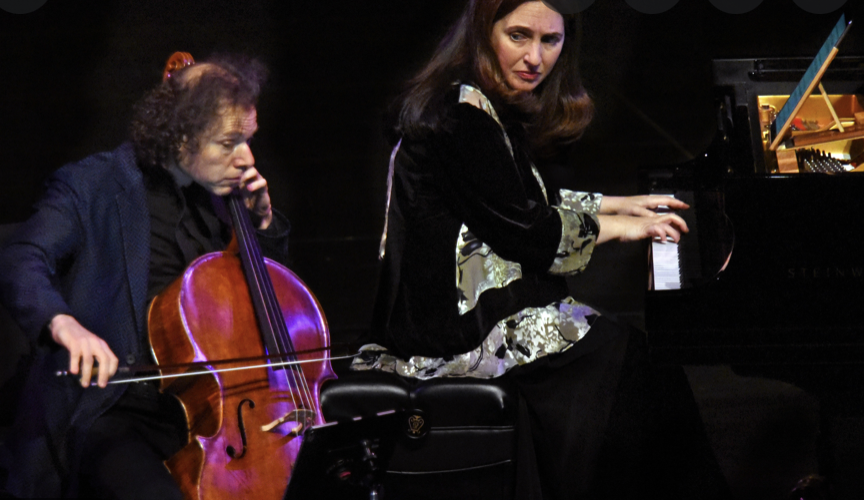|
Chamber
FAMILIAR AND NEW - TRIO NAVARRO'S SPRING CONCERT IN WEILL
by Terry McNeill
Sunday, April 21, 2024
Symphony
MONUMENTAL MAHLER 5TH IN SO CO PHIL'S SEASON ENDING CONCERT
by Terry McNeill
Sunday, April 14, 2024
Chamber
OAKMONT SEASON CLOSES WITH STRAUSS' PASSIONATE SONATA
by Terry McNeill
Thursday, April 11, 2024
Chamber
MORE GOLD THAN KORN AT ALEXANDER SQ CONCERT
by Terry McNeill
Sunday, April 7, 2024
Choral and Vocal
VIBRANT GOOD FRIDAY REQUIEM AT CHURCH OF THE ROSES
by Pamela Hicks Gailey
Friday, March 29, 2024
TWO OLD, TWO NEW AT THE SR SYMPHONY'S MARCH CONCERT IN WEILL
by Peter Lert
Saturday, March 23, 2024
Chamber
NOT A SEVENTH BUT A FIRST AT SPRING LAKE VILLAGE CONCERT
by Terry McNeill
Wednesday, March 20, 2024
THIRTY-THREE PLUS VARIATIONS AND AN OCEAN VIEW
by Terry McNeill
Saturday, March 16, 2024
Choral and Vocal
A ST. JOHN PASSION FOR THE AGES
by Abby Wasserman
Friday, March 8, 2024
Choral and Vocal
SPLENDID SCHUBERT SONGS IN SANET ALLEN RECITAL
by Terry McNeill
Saturday, March 2, 2024
|
 |
 M. Haimovitz/S. Dinnerstein |
ALLURING GLASS WORKS IN WEILL RECITAL
by Terry McNeill
Friday, March 25, 2022
On paper Matt Haimovitz’s cello recital in Weill Hall March 25 appeared a bit routine– two Beethoven Sonatas, part of a Bach Suite and a Sonata, and perhaps a newly commissioned work and an encore.
All of it happened, but the inclusion of virtuoso pianist Simone Dinnerstein turned the recital menu into a rare and scintillating corner of repertoire, all involving Philip Glass’s music. Mr. Haimovitz gave a foretaste of the pianist’s mastery of Glass with two short works, Overture and Philip’s Song, the first a newly minted composition, the second from his 2005-2010 Songs and Poems for Solo Cello. Both featured wide vibrato, rich bottom-end sonority, long note values, wandering phrasing and not a lot of dynamic contrast. Much of Philip’s Song seems related to the composer’s score for the 2002 movie “The Hours.”
Closing the first half was Glass’s 1979 piano composition Mad Rush, enchantingly played by Ms. Dinnerstein. Over just 13 minutes the pianist wove a mesmerizing tapestry of mostly quiet repetitive chords, overlapping phrases with ample pedal and using pedal point to underpin Tremolos in both hands. Long ago in the Napa Opera House I heard the composer play Mad Rush, but Ms. Dinnerstein’s dynamic control and tone color were at a higher level, and at the end of this elegant and soporific work the small audience of 250 rose almost as one in a loud ovation.
Included in the first half was the opening Prelude of the Bach G Major Suite, played by Mr. Haimovitz with revelatory phrasing, his light bowing alternating harmonic relaxations and tensions. Minor intonation slips were quickly banished as the cellist occasionally swooped into notes (not slid) and swelled to a big ritard at the concluding Fermata. One wanted more of this best-known movement from Bach’s Suites, played at exactly the same spot on the Weill stage in 2016 by Yo-Yo Ma. Mr. Haimovitz’s reading was different, slower, and just as compelling.
Following intermission was a consummate performance of Bach’s D Major Sonata, BWV 1028. Written for viola de gamba and harpsichord, a cello performance of this work with Mr. Haimovitz’s potent projection needed a modern piano’s sonority. Ms. Dinnerstein provided it with an often rollicking attack that might have alarmed Baroque purists, but the Romantic style highlighted the counterpoint, and the finishing Arpeggio flourish was stylish.
What happened to Beethoven’s Sonatas from Op. 102? The C Major unfolded with good ensemble in the Andante – Allegro and Ms. Dinnerstein’s aggressive octaves. There was no hurry to get anywhere in the interpretation where Mr. Haimovitz clipped some phrases and Ms. Dinnerstein produced a long right-hand trill in the lyrical Andante that evolved forcefully to both hands. It was artistic playing throughout, from score, with Mr. Haimovitz’s deft phrasing.
In the evening’s concluding D Major Sonata (Op. 102, No. 2) the piano line often covered the cello part, but in the 20-minute performance Mr. Haimovitz held his own with often unique phrasing and masterly bow control. The transition to the fugue was splendidly played with a touch of mystery leading to swirls of sound as the often sprightly fugue developed. Captivating music, inspiringly performed.
An encore was demanded, and as many expected it was Glass, a hothouse work titled (I think) Orchid. The cello line here was intense, occasionally sliding off pitch for effect, with the repetitive left-hand piano figurations echoing the string instrument. The vivid colors of the duo’s sound were intoxicating.
Steve Osborn contributed to this review.
|

